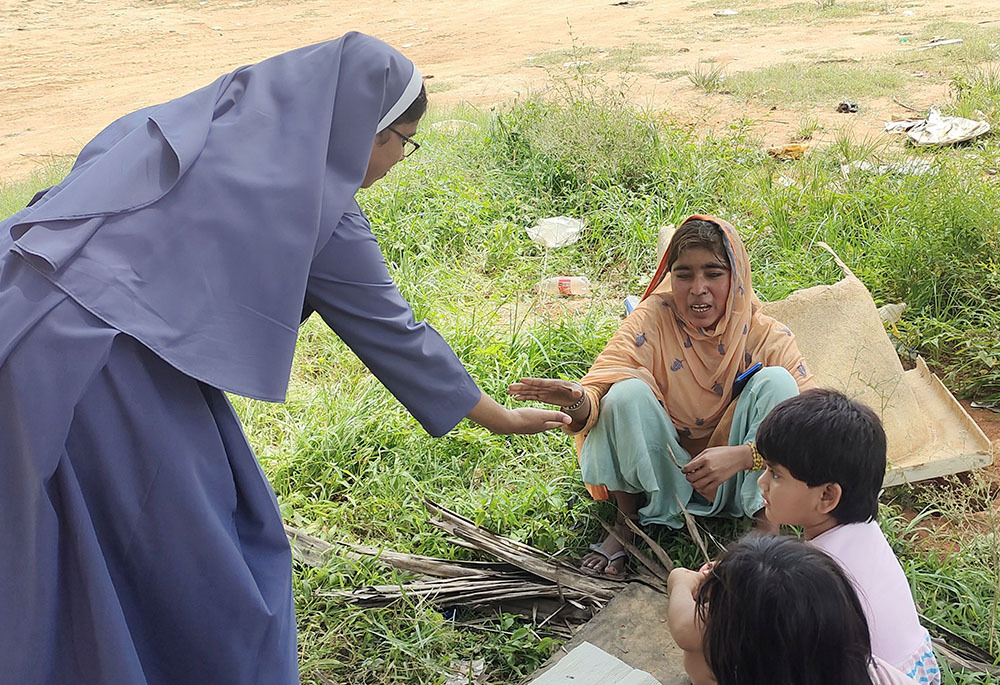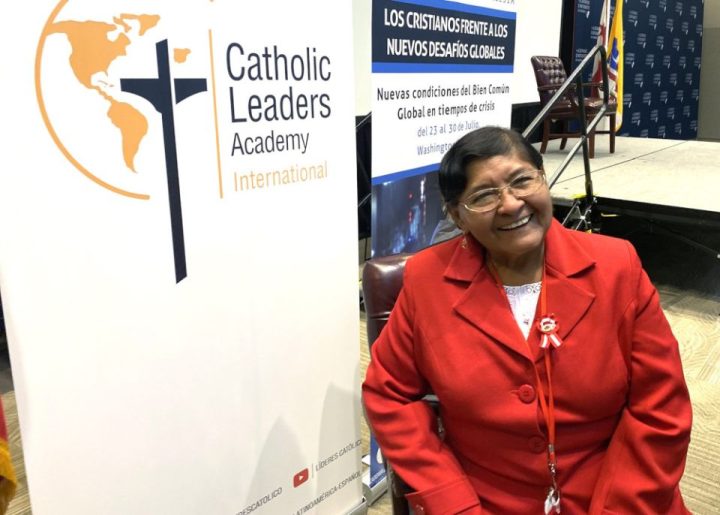
Hazeena looked pale and hungry when she came to a kindergarten managed by Catholic nuns in a southern Indian state.
A few months earlier, the 7-year-old girl was seen helping her parents in the scorching sun, segregating glasses of different colors from a garbage heap on the outskirts of Bengaluru, a southern Indian city.
The kindergarten, situated near the dumping yard, is part of Ashalaya (« House of Hope »), a social work center managed by the Poor Handmaids of Jesus Christ. They have five such early learning centers in Bengaluru and nearby Chikkaballapur districts in Karnataka state.
The centers introduce education to the children of nomadic migrant workers who, like Hazeena’s parents, work in garbage segregation units, engage in waste picking, or work in quarries and construction sites.
When Hazeena (whose name has been changed) came to the center one August afternoon, Ashalaya director Sr. Bindu Jose served her lunch before introducing her to other children, many of whom Hazeena knew already, as they come from the same Bellahalli slum on the outskirts of Bengaluru. While a normal kindergarten handles only 3-year-olds, their center at times accommodates children 7 or above who have never been to a school.
Hazeena, whose parents were migrants from the eastern Indian state of West Bengal, had earlier refused to come to the center when lay Ashalaya volunteers went to her slum. But when Jose visited the slums in search of children who don’t attend school, and came upon the girl’s hut, Hazeena trusted the 35-year-old nun and « willingly accompanied » her to the learning center, Jose told Global Sisters Report.
Hazeena soon adjusted to the classroom environment. However, two other children who had accompanied her and Jose ran away from the center’s gate.
Such things happen often, said Malatesh Meti, Ashalaya’s zonal animator and a former student of an Ashalaya learning center. Most migrant workers, he added, are reluctant to educate children who help them in their jobs. « Often the entire family is involved in the task, » Meti told GSR.
The contractors do not employ the children directly, but « they help their parents segregate glass pieces with their tender hands, often leading to injuries and infection, » he explained.
Hazeena, too, sported cut marks on her hands, as the children do not use the mandatory gloves for such jobs.
Jose said her congregation’s main objective is to educate children in difficult circumstances, whether through regular schooling, vocational training or nonformal education for the migrant children. She also noted that her students have helped some government schools that were on the verge of closure because of lack of students, as Ashalaya has also adopted two government schools and is managing them.
Jose said some children, since they lack mandatory identity cards, remain in their centers for two or three years before they are ready to join a formal school. The nuns admit the children in nearby schools after getting their parents’ approval.
Until such children get the documents, the nuns provide them nonformal education. « We cover around 360 such children every year, » she added.
The nuns also provide vocational training to school dropouts from remote villages in Karnataka and mainstream them: Of the 1,500 young adults (ages 18-35) who attend their two vocational training centers, about 75% are placed in jobs every year, Jose said.
The nuns have also formed more than 150 self-help groups for women and girls to provide about 3,000 women with nonformal education and vocational training, she added.
Jose, a social worker with a law degree who has headed Ashalaya for the past nine years, said the migrants’ children are vulnerable to child labor, sexual exploitation and early marriage.
« Education liberates them, » she said.
Another problem they face is the migrants’ nomadic nature, as they move from one place to another once a job or contract is completed.
« We are helpless about it, but most of them keep in touch with Ashalaya and if they are anywhere in Bengaluru, we reach out to them, » Jose said.
Aleena Abbas, a Muslim woman working in the Bellahalli yard, said her family does not plan to stay there for more than three months. « We will move to a new work area, » she told GSR.
One of her two daughters is in the nun’s school center while the other, aged 9, helps with the family’s job. « We will send her to the school once we complete our first load of segregated goods, » Abbas said.
Jose said job mediators or human trafficking networks bring these unskilled workers to cities, and contractors hire them for menial jobs, paying less than the minimum wage.
The migrants have no job security or safe houses, which affects the education and development of their children, the nun explained.
According to a study by the Indian Institute of Management, Bengaluru houses about 4.2 million migrant laborers, who make up 44% of its total population. Almost 50% of migrants are contractual laborers, while others are employed in the manufacturing and construction industries or in restaurants and automobile companies.
Most workers put up tents of tin and plastic at their worksite and stay in groups of four to five in unhygienic conditions. Most have no access to basic amenities such as water, sanitation or toilets, Meti explained.
Jose said skilled laborers keep their families back in their villages, but the unskilled bring them into the city, and « we work among those families. »
Jose laments that the worst affected are children and women, as their men often drown their sorrows in alcohol or drugs.
Sasikala Krishna Gowda, who coordinates Ashalaya’s women’s development programs, said their self-help groups could unite migrant women and girls to resist sexual exploitation collectively. In the past decade, Ashalaya organized more than 3,000 such women to stand on their own, Gowda told GSR.
« Earlier, they had no financial freedom, but the self-help groups taught them to save money. Some have taken bank loans for entrepreneurships, » said Gowda, who has worked with the nuns for the past 25 years.
Asha Raj, Ashalaya’s health animator, said the women also face health problems, as they live in roadside tents with « no ventilation, sanitary facilities or even toilet facilities. »
Raj, who coordinates clinics at labor camps, told GSR that they started the service since the migrants are not allowed sick leave and they do not have health insurance.
Most workers also don’t have ration cards that help them avail subsidized food, as they often leave the card with their families for their use in villages. The unskilled workers who migrate with their families use the card as an identity document to get their children admitted to schools.
Jose accompanied GSR in August to Jyothinagar, 6 miles east of Bellahalli, the site of a health clinic.
The camp houses thousands of construction workers. « Some live with their families, and we manage a preschool for their children, » Jose said.
Jose said her congregation in India has responded to founder St. Katharina Kasper’s vision of building « Little House » to shelter widows and orphans.
« Through Ashalaya we continue the ‘little house’ concept to educate and empower children and women, » she added.
Advertisement
Their work is supported by Misereor, a German funding agency.
The congregation, which began in Germany in 1851, came to India in 1970. The then-superior general, Sr. Herluka Bierbaum, opened their first house with six Indian nuns trained in Germany.
At present, about 120 nuns serve in states like Kerala, Madhya Pradesh, Maharashtra, Rajasthan and Tamil Nadu, besides Karnataka.
Their five centers in Karnataka have in the past 13 years prepared some 810 children to start formal education in government schools, said Sr. Christy Dharmaraj, a senior nun who has worked among slum people for nearly two decades.
Over the years, they have trained 1,620 people in the age group of 18-35 in vocational skills in two centers and found jobs for most of them, she claimed.
« Some of our former students are now well placed in society with jobs and families, » said Dharmaraj, who now looks after Ashalaya center in Vidyanagar near the Bengaluru International Airport.
Shalini Thimmarayappa, a ninth grader of Katherine English Medium Public School managed by the nuns, has near-perfect scores in all her subjects and was elected leader of the school’s more than 1,000 students.
She started staying in the school’s hostel after her father died.
Sr. Elizabeth Lugan, the hostel warden at Ashalaya, said Shalini is among 15 migrant students in the hostel they look after « as our family members. »
Shalini told GSR she wants to become a doctor and serve the migrants who lack housing, education and health.
« Although I have lost my father because of such a situation, I want to save many lives. »



